Portrait of a faceless man
SPECIAL REPORT | He runs one of SA Labor’s ruling factions and orchestrated the rise of the state’s last premier, but mention David Gray’s name and most South Australians would assume you’re talking about an English troubadour or retired TV comedian. So is Labor’s most reclusive powerbroker a ‘faceless man’? “That’s not for me to say,” he tells Tom Richardson.
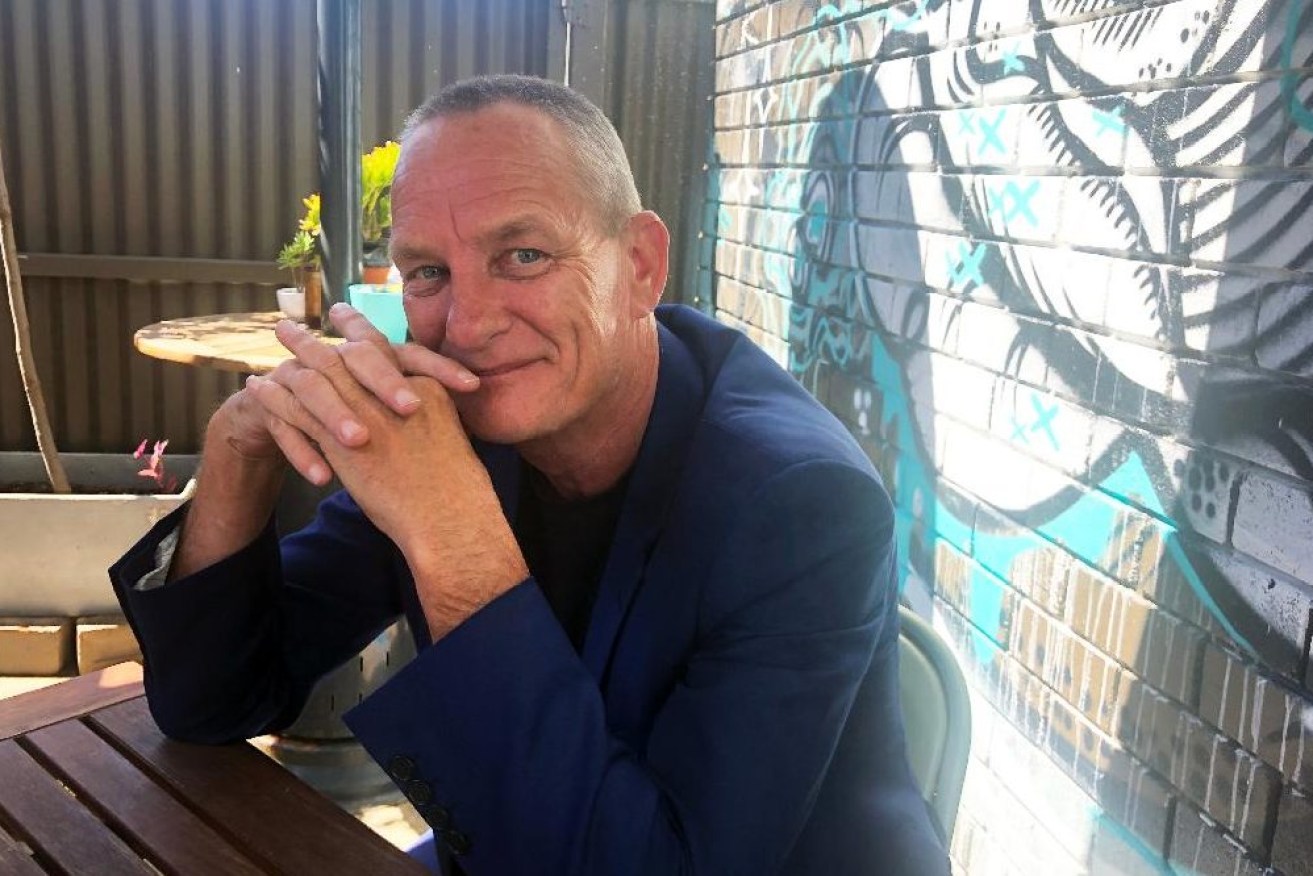
Left faction convenor David Gray. Photo: Tom Richardson
David Gray is a surprisingly dapper dresser, which is apt for someone who clearly appreciates the importance of presentation.
He understands the difference between the shop-front and the back-of-house, between what the public gets to see and the grunt-work behind the scenes to make it happen.
“There’s a reason people have their washing-line out the back,” he tells me.
But in this particular operation, Gray isn’t the one modelling the wares in the front window – he’s the guy out the back who sorts out the dirty laundry.
“The role that I play, I don’t see it as to be pushing myself forward,” he says.
“I don’t seek to be elected as a politician, and I never have… I’m first and foremost a unionist.”
So would he describe himself with that old Labor trope, the well-worn cliché that has so rankled ALP bosses since 1963, when it was coined by journalist Alan Reid to demonstrate then-leader Arthur Calwell’s subservience to his union bosses, helping doom his forthcoming campaign.
Is he a ‘faceless man’?
“That’s not for me to say; that’s for other people to say,” he responds, his voice still betraying a hint of his Glaswegian boyhood.
“But I’ve always been consistent… I think the worst Labor government is better for workers than the best Liberal one.”
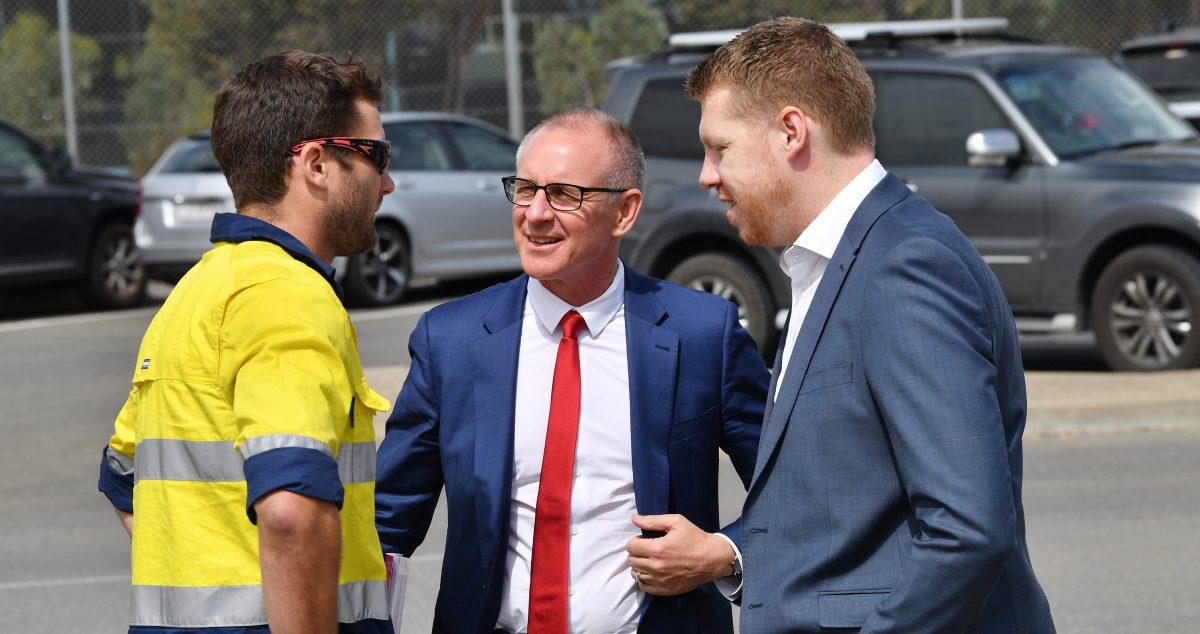
Gray anointed Joe Szakacs (right) to replace Jay Weatherill (centre) in Cheltenham. Photo: David Mariuz / AAP
So, how powerful is David Gray in South Australia?
Well, he’s a guy who runs the non-dominant PLUS (Progressive Left Union and Sub-Branches) faction in the ALP ‘machine’, and who managed to negotiate the ascension of a Left-faction premier – the first since the faction was formed in the early-1980s – who remained in place for seven years in a party run by the Right.
And then, just in case anyone was in any doubt about who was running the show, when Weatherill bowed out from a grateful caucus, he was – according to party sources – denied his preferred successor for his seat of Cheltenham, in favour of Joe Szakacs, a union boss who spent much of the past four years maligning his premiership.
A confidant and mate of Gray’s.
Gray’s choice.
I’ve had run-ins with Jay… you can’t not have arguments in this game
“Nothing happens on the Left if he doesn’t want it to happen,” one MP tells InDaily.
“No-one’s preselected without his imprimatur.”
And despite it all, he’s a guy most voters wouldn’t even know exists.
That’s pretty powerful.
“If you’re in the Labor Party, and you’re actually involved in the Labor Party, you’d know who David Gray is – and you’ve probably met him somewhere,” argues ALP state secretary Reggie Martin.
“If you worked in the trade union movement, you’d know who he is… he’s been a member of state and national executive, and state council, so within the Labor Party he’s well-known – more well-known than most.
“I’m as much of a ‘faceless man’ as he is.”
Which is probably apt. Martin is Gray’s relative equivalent in the party’s dominant Right faction, Labor Unity.
It’s convened by Sonia Romeo, secretary of the Shop, Distributive and Allied Employees Association (the SDA union, which controls the faction), but Martin, her nominal deputy, generally handles negotiations with the Left. Peter Malinauskas completes the Right’s triumvirate, although he regularly insists he’s ceded much of the factional responsibility since taking over as party leader (others in the party are unconvinced on this point).
According to Martin, Gray is “a smart operator with good judgment” who has “taken opportunities as they’ve arisen and negotiated deals in the best way possible”.
Others, though, are significantly less effusive.
They paint the Left powerbroker as an anachronism, someone who appoints mates and yes-men to crucial vacancies. They’re also critical of his management of the faction, claiming he has ceded too much to the Right in pursuit of short-term gains and promotion for his own inner circle.
But there are many more again who reject such claims, pointing to the fact that the Left, despite controlling only around 38 per cent of the party vote, have produced the previous Premier and Labor’s current deputy leader Susan Close and Upper House leader Kyam Maher.
The Left also, despite some grievances aired in the process, managed to keep their three federal MPs in lower house seats in the last round of horse-trading, despite the faction’s prize possession – the ALP fortress of Port Adelaide, held by Gray’s close mate and predecessor as factional convenor Mark Butler – evaporating in a boundary review.
Gray played a key role in the campaign that first snared one of those three seats, Tony Zappia’s north-eastern electorate of Makin, won with an 8.6 per cent swing during Labor’s halcyon days of ‘Kevin07’.
“He managed my campaign, that’s probably when I had the most to do with him,” Zappia recalls.
“I’ve always found Dave to be fair and reasonable in his approach to matters but he’s also got a good political intuition.”
After the retirement of Trish Draper, Zappia was up against a cashed-up Bob Day, who “put an incredible amount of effort into his own campaign, including financial, and overspent us many times over, and campaigned very hard and very well”.
“Yet we managed to win that seat and win it very comfortably,” he says.
“Regardless of the momentum, I think there’s no doubt it was a very well-run campaign and David had a lot to do with that.”
Zappia believes one of Gray’s main strengths is that “to my knowledge he’s never had any political aspirations of his own, which allows him to be very objective in his judgments”.
But he concedes those judgments – and their implementation – have left a few noses out of joint along the way.
“Obviously there’s always going to be people who have grievances with the way he’s managed things – there’ll always be disaffected or dissatisfied people within the system… but that’s the nature of the role he holds,” says Zappia.
Senator Don Farrell concurs – and he’d know. Through his time at the helm of the SDA, Farrell was known as SA’s factional ‘Godfather’, convenor of the dominant Right bloc.
It was Farrell’s successor, Malinauskas, who worked with Gray to keep the factional peace over the past decade of state Labor rule.
“I think [Gray] deserves a fair bit of the credit for the stability of the SA branch of the Labor Party through 16 years in government,” Farrell tells InDaily.
“People sometimes forget just how unstable the SA branch used to be, with all the factions fighting amongst themselves [so] he provided some stability on the Left – but he wasn’t always a popular figure in the Left.
“There are lots of people who don’t like him – but I’ve always found him to be a pretty decent sort of bloke… he just strikes me as an ordinary sort of bloke, to be honest with you.”
Asked why such an ‘ordinary bloke’ would leave such a trail of enmity – in particular within his own factional tent – Farrell muses: “I’ve not experienced it myself, but he must be very direct when he tells you something, like you’re not going to get a preselection or promotion – people take that sort of badly.”
But he concedes it goes with the territory of being a factional convenor.
“The people that you promote or support often quickly forget you’ve supported them, but the people you’ve opposed or stopped from being promoted harbour that grudge and never let you forget it,” he says.
People have aspirations, and sometimes they don’t have abilities that meet those aspirations
An interesting thing about David Gray: for a guy apparently disliked by so many people, it’s hard to find anyone prepared to say they dislike him.
One notable response was “if you haven’t got something nice to say, then don’t say anything”.
I got that one twice.
Then there’s the story FIVEaa presenter and former Daily Telegraph and Sunday Mail editor David Penberthy tells of receiving online ‘hate mail’ (and even a belligerent phone call) from someone calling themselves “Arther” – but sent from Gray’s union email address.
“He’s someone who long ago mistook anger for an ideology,” says another insider, trying, I think, to be kind.
Gray concedes he’s made enemies.
“Of course,” he nods, matter-of-factly.
It’s an occupational hazard for someone who makes and breaks political careers. Or a perk of the job, depending on how you’re wired.
“People have aspirations, and sometimes they don’t have abilities that meet those aspirations – or the ability to convince people they’ve got them – and people get disappointed,” he explains.
“Some people are very driven, and if they see you as someone who frustrates those aspirations, they resent you…
“But I haven’t deliberately made enemies.”
I don’t stab people in the back – I stab them in the guts
The Left, over the years, has seen its share of defectors to Labor Unity, among them Lee Odenwalder, Tony Piccolo and, more recently, Jo Chapley, who won state election preselection for the Right in Adelaide after eschewing Gray’s offer of the newly-created north-eastern marginal of King.
Chapley didn’t win Adelaide, and many believe she would have had a better chance of cracking King, where Labor’s Julie Duncan fell short against Liberal Paula Luethen.
Gray’s management of the faction was also cited as a catalyst for a recent rebellion – quickly snuffed out along factional lines – by the minor gaggle of hard Left unions that sit outside the larger PLUS Left faction.
But Gray insists: “I’d reject there’s divisions within the faction.”
“I’ve been elected unopposed 10 times as convenor,” he notes.
One who is scornful – and, since quitting the party in 2017, at liberty to say so – is Florey independent Frances Bedford.
She laments the Left’s “poor campaign” in King, which falls close by her north-eastern patch, and denies Gray’s leadership of the faction has been a success.
“He makes dreadful deals – the Right tells him what’s going to happen and he goes out and does it,” she says.
Bedford didn’t appreciate Gray’s input in the Makin campaign, feeling like an outsider had surfed into her backyard, after she oversaw Zappia’s 2004 effort, which also garnered a swing but fell short.
But her major beef is with what she says is a degrading of democracy in both the major parties, claiming that the likes of Gray promote yes-men and women at the expense of genuine debate.
“We’re not going to end up with a rigorous parliament where dissent plays a role in decisions if everybody does what these people tell them to,” she says.
“That [process] devolves the role of state council and caucus and other groups within the party, and that’s what it gets down to doesn’t it? We’ve got to get some democracy back in the two major parties… if it’s just two people running the show – what are we doing?”
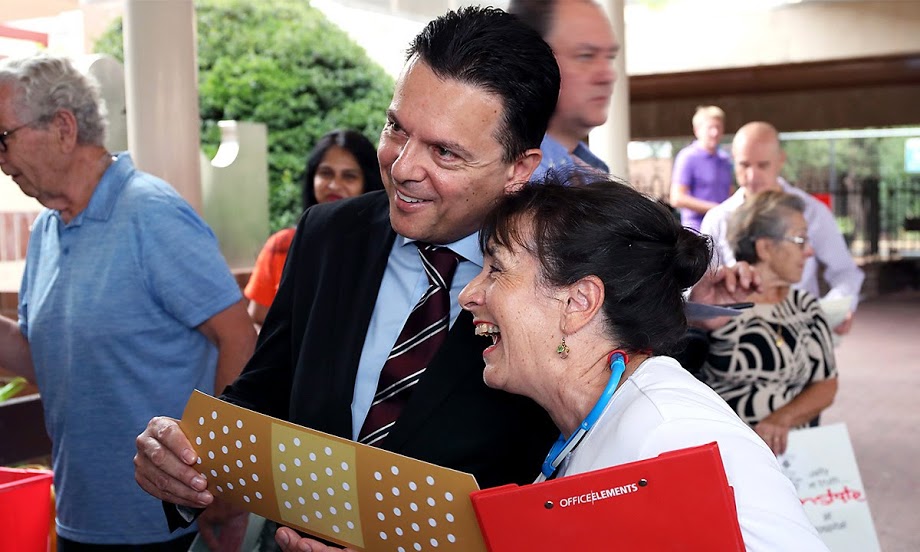
Frances Bedford with Nick Xenophon – neither of whom are fond of David Gray.
His personal style might rub colleagues the wrong way, but Gray says it’s direct and upfront.
“I don’t stab people in the back – I stab them in the guts,” he says with a wry grin.
During a birthday party tribute to his mate several years ago, Butler pondered the pronunciation of the word he’d best use to describe Gray – “brusque” – before settling instead on “abrupt”.
“I’m from Glasgow – that’s my nature,” Gray chuckles.
“But I’m someone who thinks you have to work within the tent, rather than outside pissing in.”
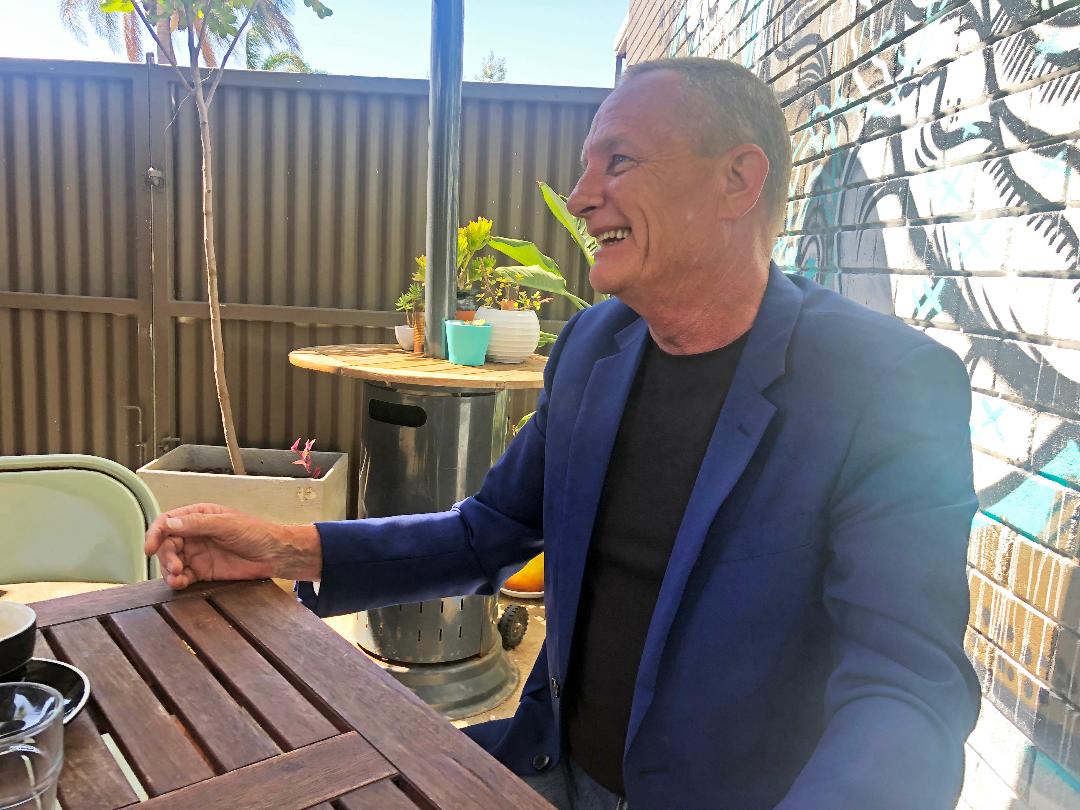
For a guy who hasn’t returned a single one of my calls in about five years of trying, Gray appears happy to talk.
He’s long been an enigma of SA politics.
An Assistant Secretary (and current Acting Secretary) of United Voice, the former Liquor, Hospitality and Miscellaneous Workers’ Union (LHMU, colloquially known as ‘the Misos’), he’s convened the Left faction for the past decade, being re-elected to the role each year.
But I’ve covered politics in this state since 2003 and I’d never met him before this week.
I didn’t even know what he looked like.
I’ve never managed to track down a photo (oh, except that’s apparently him below, delivering a speech to the union’s SA delegates 2017 convention about “the rise of inequality in the community” – he’s the grainy figure in the distance!)
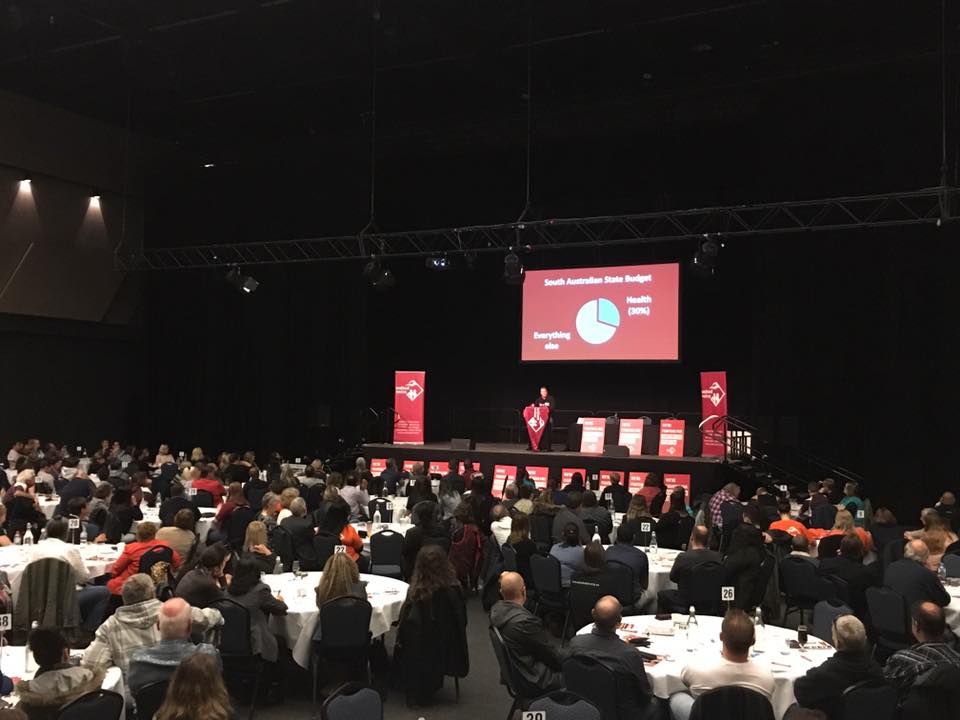
Photo: Facebook
Once – some years ago, shortly after Weatherill’s ascension – The Advertiser apparently included him on one of their regular ‘power lists’, and even they didn’t have a photo. Instead, they ran a generic silhouette.
When I began working full-time for InDaily in early 2015 I sought him out, but never got a call back.
Over the intervening years I routinely sought comment on various stories, most often on factional, rather than union, issues. Never got a call back.
(PLUS, incidentally, appears to have a website; it clicks through to a 404 error.)
And then, finally, late last year I resolved that I would write a profile on the guy, with or without him.
“About fucking time,” said one party insider.
But they didn’t comment.
In the absence of a photo, I resolved to instead illustrate the article with an old publicity shot of comedian ‘Ugly’ Dave Gray, and a caption saying something like: “This is a photo of Dave Gray, but not the union leader Dave Gray, because there appears to be no public record of the union leader Dave Gray.”
Still, as I called around, word got back to him, and one MP managed to persuade him that if I was writing an article, he might as well be there to put his side of it.
Or, as he might put it himself, that it’s better to be inside the tent, pissing out.
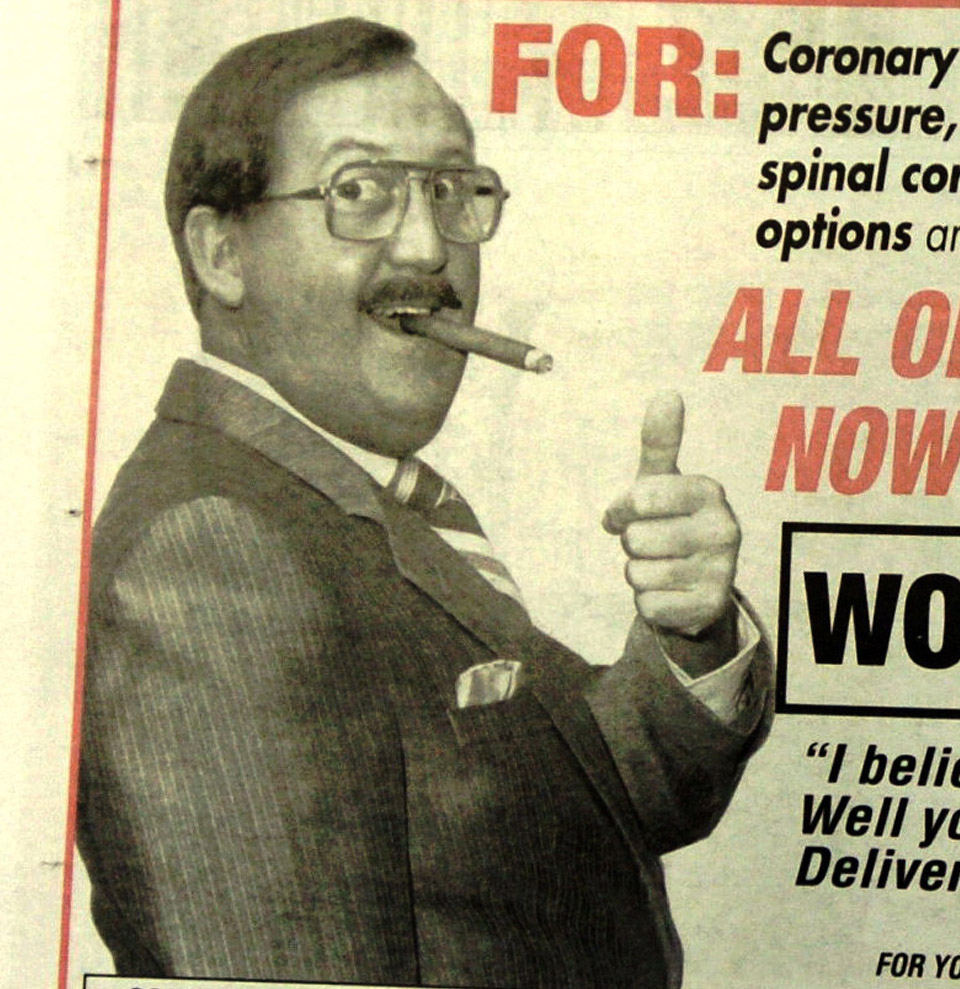
The other Dave Gray.
So this interview has been, to put it mildly, some time coming.
Having long written about the guy without ever having knowingly clapped eyes on him, I’d been sort of expecting an old-school shop-floor union boss – broad-shouldered, sharp-tongued, clad in double denim and steel-toed boots.
I make a conscious choice to leave my ubiquitous RayBan aviator sunnies in the car, in case they look too bourgeois or something.
Instead, though, the man who emerges into the foyer of the union’s Henley Beach Rd HQ to greet me is surprisingly slight, perfectly friendly and sporting a trendy electric blue blazer and Converse sneakers. And RayBan aviators.
Gray is 60, but a well-weathered 60.
We stroll down Henley Beach Rd, crossing at roughly the spot where, he points out, he once saved the life of future Labor leader Malinauskas when he stepped out into the street with an uncharacteristic lack of due diligence.
Our destination is a trendy, hole-in-the-wall-style Mile End coffee shop, complete with designer graffiti.
The strip has changed a lot, Gray notes. When he started at the union last century, about all you could get round here was a pie with sauce.
On arrival he orders a long black, two sugars, which for some reason makes me think of a line from the malevolent gangster Brick Top in the 2000 Brit flick Snatch: “I’m sweet enough.”
Gray’s journey has always been intertwined with Butler’s.
They started at the Misos within a week of one another in 1992.
“We were from pretty different backgrounds,” Butler recalls.
“He’d come from the shop floor with the metalworkers’ union.”
Gray began his working life as a welder. His last gig before joining the union full-time in ‘88 was manufacturing and fabricating concrete skips at a factory in Edwardstown – right across the road from Marshall Furniture, where SA’s current Premier learned the family business.
“Wherever I worked, I’d always say to myself ‘be in the union, but don’t get too wrapped up in it’ – but I always did,” he recalls.
“I couldn’t help myself… I always wound up being the shop steward.”
At the Misos, he specialised as a workers’ compensation advocate, coming into his own after the Brown Liberal Government’s landslide election win in ’93, when, as Butler recalls it, they “embarked on a hard-right overhaul of workers’ compensation laws”.
With the Democrats and Labor holding the line against it in the Upper House, “Dave started to be recognised as the key compo advocate and policy person in the show”.
After a return to the metalworkers’ union and a foray into superannuation advocacy – a field then replete with colourful acronyms such as LUST (the Liquor Union Super Trust) and PIST (the Printing Industries Super Trust) – he later returned to the LHMU when Butler became secretary, leading the union’s advocacy unit.
It was a tight-knit group – Gray used to play golf each week with Butler, Weatherill (then an industrial officer with the AWU) and the union’s lawyer Simon Blewett, who would later become Weatherill’s chief of staff.
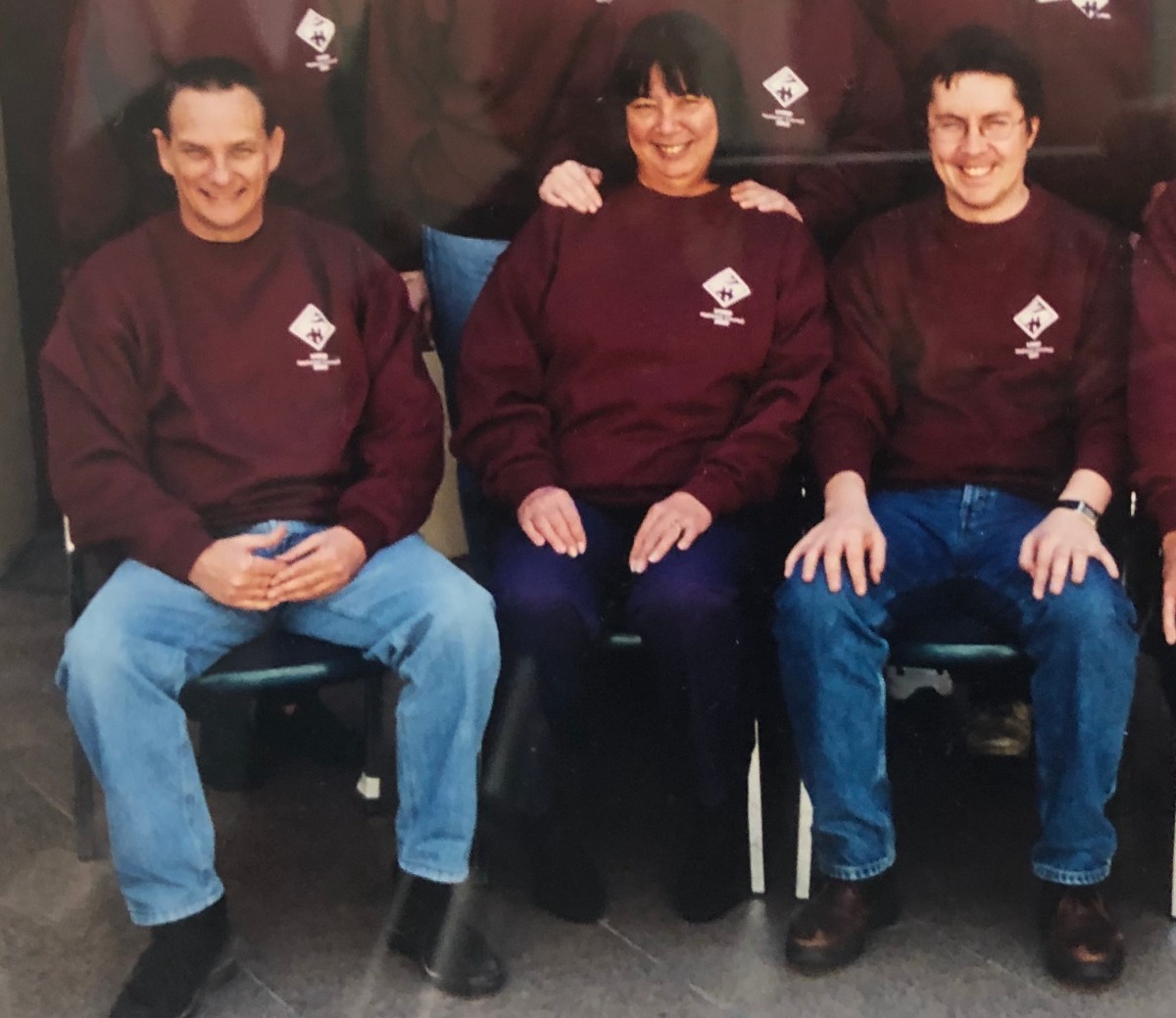
Gray (left) and Butler (right) in 2002, from a picture on the wall of the United Voice office.
“We were mates, obviously, and he was always supportive [but] he was never particularly politically active – he really kept himself to that sort of work,” Butler says.
That changed with a major role in the landmark ‘Your Rights At Work’ campaign against the Howard government’s WorkChoices reforms.
“That was when he picked up an overtly political role, a campaigning role and a factional role,” Butler notes.
“Until WorkChoices, I was always a party member, but never really involved myself in the politics,” Gray agrees.
He oversaw the campaigns for the Left’s four target seats in the 2006 state election – the ‘Rannslide’ – picking up Light, Hartley and Mawson.
His candidate for Mitchell, Rosemary Clancy, fell short against independent (and former Labor) incumbent Kris Hanna after preferences.
Over a decade on, her daughter Nadia is Gray’s current candidate for the federal seat of Boothby, covering the same southern suburbs terrain.
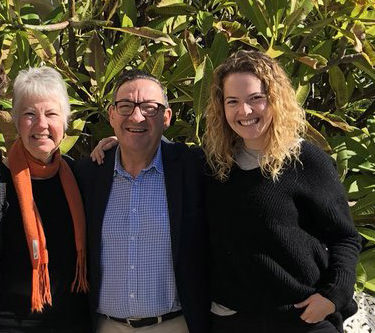
Nadia Clancy with her mother Rosemary and factional colleague Steve Georganas.
Gray demonstrated similar campaigning prowess in a foray into Queensland, where he helped Labor pick up seats it wasn’t counting on winning.
When Butler entered parliament in 2007, Gray went with him to Canberra for a short time, before returning to the union to take over his role as factional convenor.
But he insists his political journey began “basically by default”.
“I came into it from a different field from all of them – Jay, Peter, even (Pat) Conlon – they all came with a not-concealed ambition to be parliamentarians… whereas I became a unionist – that was my ambition.”
Nonetheless he discovered a latent knack for political campaigning.
“We’re consistently changing how we campaign – everyone’s becoming more sophisticated at it, with the narrowing down of that swing vote,” he says.
“But I’m not a complete convert to digital and focus groups – I still believe there’s a place for gut-feel, and talking to people in the community.”
A “classic example” of that, he says, is what he derisively refers to as “Jay’s nuclear frolic”.
“A lot of people came out saying ‘we’re against it’, but we took the approach of saying ‘we’ll survey our members first’,” he recalls.
The union ballot came back much as the Premier’s ill-fated citizen’s jury had – resoundingly opposed.
“As soon as we had that, we advised him we were opposed,” Gray says.
That was that for the nuclear vision.
I’m someone who thinks you have to work within the tent, rather than outside pissing in
Gray insists there’s no bad blood between him and Weatherill – who did not respond to inquiries for this article – despite the nuclear fallout and the back-room standoff over Cheltenham.
He insists he ran the preselection as “an open forum” and “there were a number of aspirants for the seat”.
“It’s an open and transparent process, and everyone’s free to run,” he says.
“I’ve always called for candidates, and put up an opportunity for candidates to stand. And if people choose, after making an assessment, not to stand… then that’s something they’ve done, usually, with a view to something later on – and I don’t have a problem with it.”
He concedes “I’ve had run-ins with Jay… you can’t not have arguments in this game”.
“But if you’re going to have lifelong enemies, you’d be a pretty miserable bastard – and I’m not.”
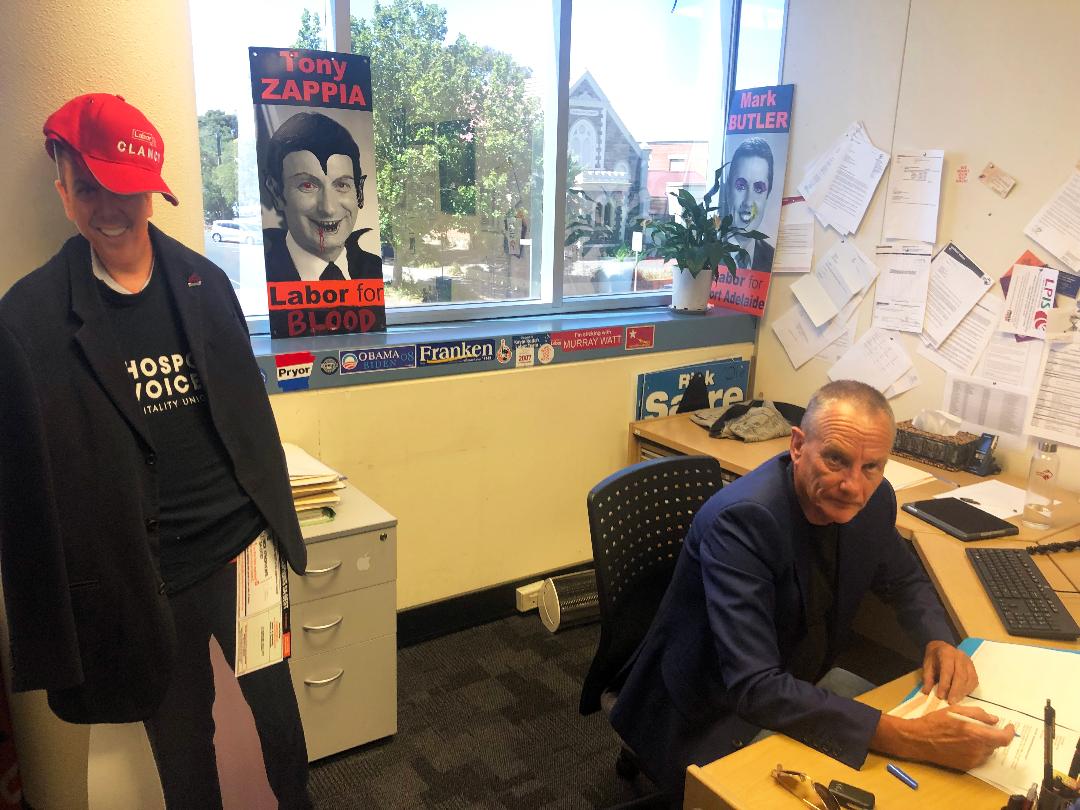
Gray in his Mile End office this week. Photo: Tom Richardson
Gray’s United Voice office is an eclectic mish-mash of campaigns past – corflutes amusingly defaced by punters, lovingly (or ironically) preserved. The collection includes a life-size effigy of Nick Xenophon – one of his prized scalps, after his union-backed campaign on penalty rates helped take skin off the then-senator in 2013.
He also took extra relish in helping defeat Day – a veteran of the H.R. Nicholls Society – in Makin.
“I’m progressive,” he says of his political ideology.
“I’ve been a staunch advocate for same-sex marriage – no-one was more relieved than me that it wasn’t an issue at our last national conference.”
He agrees that progressive politics may not be a priority for his members on the shop-floor: “Sure, there’s a person on the factory floor who won’t hold those views on social issues, but I always did – even when I wore overalls on the factory floor.”
He says he believes in people’s right to hold different views – “but that doesn’t extend to Nazis down at St Kilda,” he says, referencing last weekend’s ugly anti-immigration protest.
“There’s a line.”
You’ve got to frame your argument better and persist – I’m a persistent bugger
Gray says he’s a pragmatist at heart.
“I always think a small win is better than no win,” he muses.
“I still look at the Greens who threw away the opportunity to have an emissions trading scheme… that’s not how I’ve ever operated.
“You’ve got to be there, make your argument – and if you’re not successful you don’t just tip the toys out of the cot… you’ve got to frame your argument better and persist.
“I’m a persistent bugger.”
Ironically, one of Gray’s biggest cheerleaders is the Right faction’s Reggie Martin.
“I get on with Dave really well,” Martin insists.
“He’s always been an honest operator… he’s a true Labor Party guy and he’s always trying to get the best interests of the Labor Party.
“If he says you can trust him, that’s what he’s going to do… neither one of us is trying to bullshit the other, because you know you get caught out bullshitting.”
He says Gray is “a smart operator with good judgment” who “negotiates deals in the best way possible – that’s when everyone wins, rather than someone having to lose”.
“This is the good thing about the Labor Party in SA – I don’t know whether we’re unique, but we’re close to unique in that the factions have a good, professional relationship where we can sit down and try to negotiate an outcome which is best for everybody… and if you have a certain percentage of the votes, you get a certain percentage of the spots.”
In other places, he points out, “if you get 50 per cent of the votes plus one, you get everything”.
“We haven’t operated that way for some time, and the results we’ve had in the last 20-odd years shows that’s a good way of doing things.”
Butler concurs.
“David has broadly been recognised as having really provided a ballast of stability, really along with ‘Mali’, that allowed the government really to focus on governing, rather than the instability that still a lot of branches of our party continue to have to deal with,” he says.
“When I was first becoming involved with the party 20 years ago, it was a party largely at war with itself.”
He says Gray’s success is embedded in the fact “he’s not ever had any interest in advancement himself”.
“We’re confident of that… it’s been a very selfless, traditional convenor’s role I think he’s played,” he says.
“It was under the radar, but a really important bedrock of stability to allow Mike, and then Jay, to be a pretty effective government.”
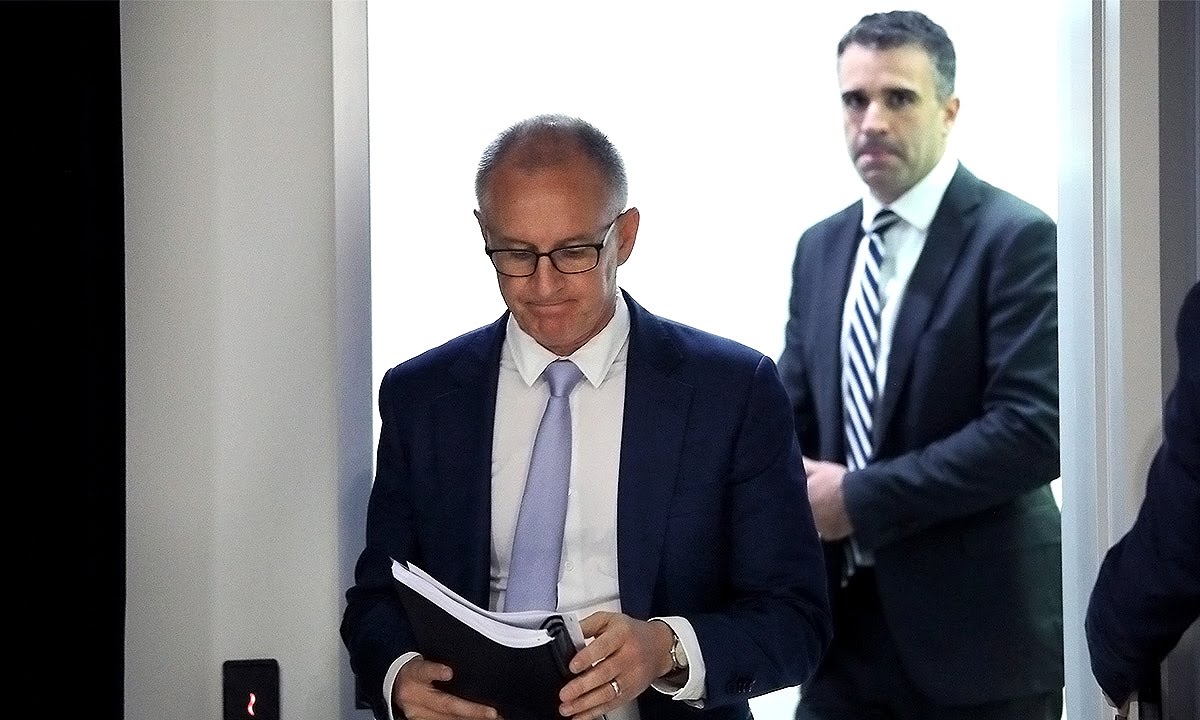
Weatherill with his successor Peter Malinauskas. Photo: Tony Lewis / InDaily
Gray concedes “there’s a coterie of people who are dissatisfied” with his stewardship, but insists: “The faction’s never been more financially sound, and we’re well represented for our percentage in the party.”
“We’re almost in a power-share with the Right – without the numbers,” he grins – conceding, though, that this is in large part due to the Right’s inherent pragmatism.
“Yes, there’s no doubt about it – it comes down to, if you’re going to play a ‘50 plus one’ takes all game, why should the ‘49 per cent’ put their shoulders to the wheel?
“I’ve had 20 years of the ‘machine’, for want of a better word – with Farrell and Butler, and me and ‘Mali’, and now Reggie… and it’s pragmatism on both sides.
“Achieving something is better than achieving nothing.”
So what, then, is his greatest achievement?
He doesn’t have to think for long.
“Busting the myth that we’d never have a Left Premier,” he smirks.
“Some people did say [after Jay’s elevation]: ‘What’s your next trick?’”
But he adds that an enduring legacy has been “to keep a solid working relationship between all the groups”.
“Despite differences in philosophies, or assessments of people’s character – in the main, the peace is kept,” he says.
“And most people are focused on fighting the Tories!”
He needs to have a stake covered in garlic sauce plunged into his heart by a virgin under a full moon
Bedford is in no doubt that the ‘Faceless Man’ moniker sits well with David Gray.
“Yes – wouldn’t you?” she says when asked if she’d describe him as such.
“He’s certainly a backroom operator, who seems to know where the bodies are hidden – because he’s still there… he’s got more lives than a cat – he needs to have a stake covered in garlic sauce plunged into his heart by a virgin under a full moon, or something.”
But the final word on that question should go to the South Australian most publicly synonymous with the trope – former Right faction convenor Farrell.
“The term ‘Faceless Men’ has developed a different meaning in the current context, but I think you’re probably pretty accurate to describe him as a faceless man, behind the scenes,” Farrell concedes.
“That term would fit him more accurately than others, I think.”
I don’t think the public are interested in that stuff
Gray says the ability to resolve factional tensions, particularly over preselections, behind the scenes – as opposed to the Libs’ frequent public slanging matches – is a positive.
“I think it’s a credit to the party,” he says.
“There’s probably no difference between the parties – it’s just the management.”
And while that may lead to accusations the factional machine is a blight on party democracy, he sighs: “You’re damned if you do, you’re damned if you don’t.”
“I don’t think the public are interested in that stuff,” says Gray, as we begin our trudge back up Henley Beach Road.
“I think they’re interested in the end product… not internal squabbling or bickering – but how do we end up.”




